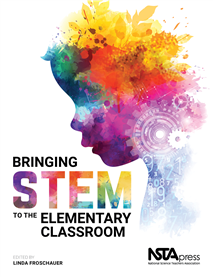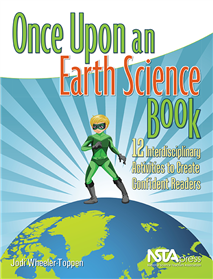All Book Chapters
Book Chapter
This chapter features a STEM investigation project for intermediate students with real-life connections. The goals for this unit were to help the students understand systems and system models in real-world contexts and to be able to distinguish the p...
Book Chapter
In this chapter, toy testing creatively engages fifth-grade students in engineering design. This toy rocket unit engaged fifth-grade students in an engineering design process that allowed them to integrate engineering, physical science, and mathemati...
Book Chapter
A “Snapshot of Science” Program brings science and engineering into the library. The lesson described here is part of what we like to call a “Snapshots of Science” program. These mini-lessons of science are taught once a week to all students ...
Book Chapter
An integrative science unit combines science content on severe weather with the engineering design process (EDP). The purpose of this unit is to interweave science content on severe weather with the EDP. The unit includes concepts such as properties ...
Book Chapter
Straw Rockets Are Out of This World
This chapter features STEM activities for upper-elementary students. This lesson gives students the opportunity to experience the joys and challenges of developing straw rockets and then observing which design can travel the longest distance. The les...
Book Chapter
In this chapter, learning about plant structures helps students design water collection devices. This chapter describes the final lesson in a seven-day STEM and literacy unit that is part of the Picture STEM curriculum. The engineering design compone...
Book Chapter
When confronted with a robotics engineering task, fourth-grade students develop growth mindsets. In this chapter, the tightrope challenge will be discussed and a length of rope is suspended at student height and secured at each end of the room. While...
Book Chapter
Model-eliciting activities (MEAs) create opportunities to incorporate new standards and evaluate teacher performance. MEAs are simulated real-world problems that integrate engineering, mathematical, and scientific thinking as students find solutions ...
Book Chapter
This chapter contains information on teaching reading strategies that can help students improve their reading and help them to begin to view reading as an active search for meaning. The first step is to create a classroom culture in which students fe...
Book Chapter
How Do You Know That? Helping Students With Claims, Evidence, and Reasoning
At one time, teachers were not familiar with the concept of scientific argumentation—the process of making claims and supporting them with evidence. Since that time, both the Next Generation Science Standards (NGSS) and the Common Core State Standa...
Book Chapter
This chapter has two main goals. The first is to ease students into the reading procedures by featuring two reading passages. One allows students to practice using codes to record what they are thinking as they read and the other one lets students pr...
Book Chapter
This lesson is designed to introduce students to the key ideas and vocabulary associated with erosion. Students will see erosion at work in a simulation and try out some different ways to lessen the effect. Then they will read about the three main ag...
Book Chapter
Plate tectonics is the primary theory that drives explanation in geology, but the idea that land masses drift around the Earth can sound as crazy to students as it did to geologists in the early 1900s. Spending time on the history and evidence of pla...
Book Chapter
The Ocean on Top of a Mountain
In this chapter, students will simulate the “life” of a mountain and then think about what traces of each stage of the mountain’s life are present at the end of the simulation. Then they will read about the Burgess Shale and how scientists used...
Book Chapter
Many students have never looked carefully at rocks. For this reason, looking closely at several different types of rocks is important for preparing them to learn about how rocks are classified. In this chapter, one goal is to help students see how id...



